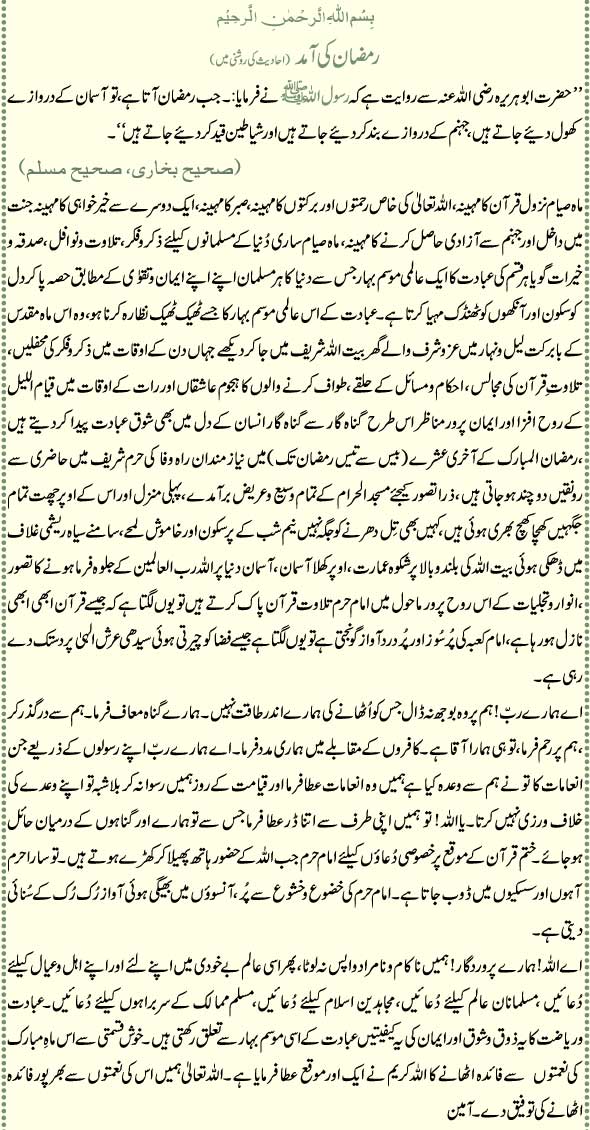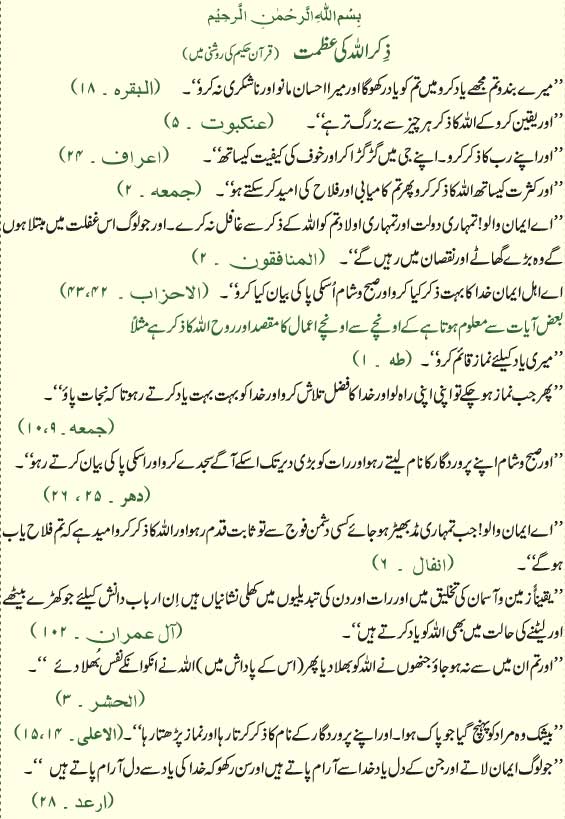
Ramadan: The Month Of The Qur’an
Allah says that the Last Revelation of His was sent down in the month of Ramadan on the Night of Power Lailatul Qadr. (Qur’an, 91:1-3.) It is the month of Ramadan that Allah has honored it by revealing the Qur’an. Because of this strong relationship between the Qur’an and the month of Ramadan, Prophet Muhammad (peace be upon him) used to read the Qur’an to Archangel Jibreel every Ramadan.
Therefore it is the right place to discuss the purpose and objective of the revelation of the Qur’an, its importance, the various hostile campaigns against it, and the do’s and don’ts of the Qur’an.
First of all, Allah the Highest created man and gave him the gift of expression. For the guidance of mankind, Allah sent Prophets to every single community. It is stated in the Qur’an, which means that there has been no community to which God’s Messengers have not come and that Muslims should make no distinction between Allah’s Messengers. So it is the duty of a Muslim to honor all the Prophets equally.
The Qur’an represents the culmination of all earlier Revealed Books. It is the last of the Revealed Books sent down by Allah for the guidance of mankind. The Qur’an is the only scripture, which requires the belief in other revelations, as part of the Islamic Faith.
This Sacred Book was revealed to the last Messenger, Prophet Muhammad (peace be upon him) in the month of Ramadan as Allah Himself said in the Qur’an: “Ramadan is the (month) in which was sent down the Qur’an, as a guide to mankind, also clear (Signs) for guidance and judgment (between right and wrong).” (2:185) Allah the Most High has especially mentioned the exact date and month of the revelation: “We have indeed revealed this (Message) in the Night of Power.” (97:1) So the purpose of the revelation of the Qur’an was to provide true guidance to mankind.
The Qur’an is emphatic in proclaiming that Islam is the religion of all Prophets: the religion of Abraham, Moses, and Jesus (peace be upon him). It stresses that Prophets Moses, Jesus, and all others were not Jews but Muslims. “Surely those who believe (in that which is revealed to Muhammad (peace be upon him) and those who are Jews, and the Christians, and the Sabaeans – whoever believes in Allah, and the Last Day and does good, surely their reward is with their Lord, and there is no fear for them nor shall they grieve.” (2:62).
“A Guidance for mankind and clear proofs for the guidance and judgment (between right and wrong),” is the most important characteristic of the Qur’an, the Book that Allah has revealed to His last Messenger to serve as the only Book of man’s guidance till the Day of Judgment. It is guidance for mankind having clear proof of judgment between right and wrong in all matters of human life.
Before the revelation of the Qur’an, it was preserved and guarded from every kind of corruption in the “Mother of the Book.” Allah Himself said: “Nay this is a Glorious Qur’an (inscribed) in a Tablet Preserved” (85:21-22).
When Allah wanted to give this Trust to someone, the heavens, the earth, and the mountains, i.e. other creatures of Allah, besides man, shirked from shouldering this Trust or responsibility. They preferred to submit their will entirely to Allah’s Will, which is All-Wise and Perfect, and which would give them far more happiness than a faculty of choice, with their imperfect knowledge. Allah says in the Qur’an: “We did indeed offer the Trust to the heavens and the earth and the mountains; but they declined to bear it, being afraid thereof: but man undertook it: He was indeed unjust and ignorant of its results.” (33-72).
So it was the man who took the responsibility of the Trust without realizing its importance and consequences. The Qur’an is the revealed book of God which has been in existence for more than 14 hundred years and the Word of Allah is preserved in its original form.
There has not been an iota of change in this unique Divine revelation. Its originality and authenticity have been guaranteed by no other than Allah the Almighty who challenges in the Qur’an itself on various occasions.
Allah said, “This Qur’an is not such as can be produced by other than Allah: on the contrary, it is a confirmation of (revelation) that went before it, and a fuller explanation of the Book – wherein there is no doubt – from the Lord of the Worlds.” (Qur’an, 10:37).
In another verse of the Qur’an Allah challenges, “Or do they say, “He forged it?” Say: “Bring then a Surah like unto it; and call (to your aid) anyone who can, besides Allah if it be you speak the truth!” (Qur’an,10:38) “Or they may say, “He forged it.” Say, “Bring you then ten Suras forged, like unto it, and call (to your aid) whomsoever you can, other than Allah! – if you speak the truth!” (Qur’an,11:13)
Allah said in the Qur’an, “And if you are in doubt as to what We have revealed from time to time to Our servant then produce a Sura like thereunto, and call your witnesses and helpers (if there are any) besides Allah if you are truthful.” (Qur’an, 2:23)
People of every age have been challenged to produce a Book like it and they were unable to produce one. It is the only Revealed Book whose text stands pure and uncorrupted today. Allah said, “Say: “if the whole of mankind and jinns were to gather together to produce the like of this Qur’an, they could not produce the like thereof, even if they backed up each other with help and support.” (Qur’an, 17:88)
Since the revelation of the Qur’an, the enemies of Islam have been trying to distort its life-giving messages. Firstly, they said, it is not Allah’s revelation, it has been dictated to Prophet Muhammad (peace be upon him) by someone.
Then they started attacking its authenticity and originality. In spite of their conspiracies, the Qur’an has been preserved in its original form.
The Qur’an is the only Divine revelation that has remained for the past 14 centuries uncorrupted and pure without any human interpolation or change and will remain so till the Last Day as Allah has guaranteed its purity. (Qur’an,15:9).
The purity, preservation, and propagation of the Qur’an was maintained by two methods: memorization of the Qur’an in the Qur’anic schools and the recitation of the complete Qur’an in Ramadan. In the month of Ramadan every year, the Noble Prophet (peace be upon him) would Qur’an with Archangel Jibreel.
Abu Huraira reported that the Prophet used to repeat the recitation of the Qur’an with Jibreel once a year, but he repeated it twice with him in the year the Prophet (peace be upon him) died. The Qur’an was recited in the Taraweeh for the first time during the era of Caliph Omar (may Allah be pleased with him).
Though many Huffaz and Islamic scholars were killed in the different parts of the world at different times, still there is no dearth of Islamic scholars who can recite the complete Qur’an from memory. Severe campaigns have been launched against the Qur’anic schools, which teach the study, recitation, and memorization of the Qur’an.
The Qur’an is the main Book of the Muslims and it is the duty of the Muslims to learn the Qur’an, which contains their code of life and ethical values whose benefits have been experienced by mankind throughout the ages.
We have discussed the objectives and importance of the Qur’an and how its originality and purity have been maintained. Our Prophet (peace be upon him) and his Companions dedicated their whole lives to the worship of Allah. Their lives revolved completely around the Book of Allah, the Qur’an, reciting it in and out of Salah.
The Qur’an is the basis of the religion of Islam, and on the preservation and propagation of Allah’s Book depends the very existence of this Faith. Hence the virtues of learning and teaching the Qur’an are self-evident and do not need further elucidation.
The Prophet (peace be upon him) said, “The best amongst you is he who learns the Qur’an and teaches it.” (Bukhari, Daud, and Tirmidhi).
Namaz-e-Taraweeh Aur Rakat
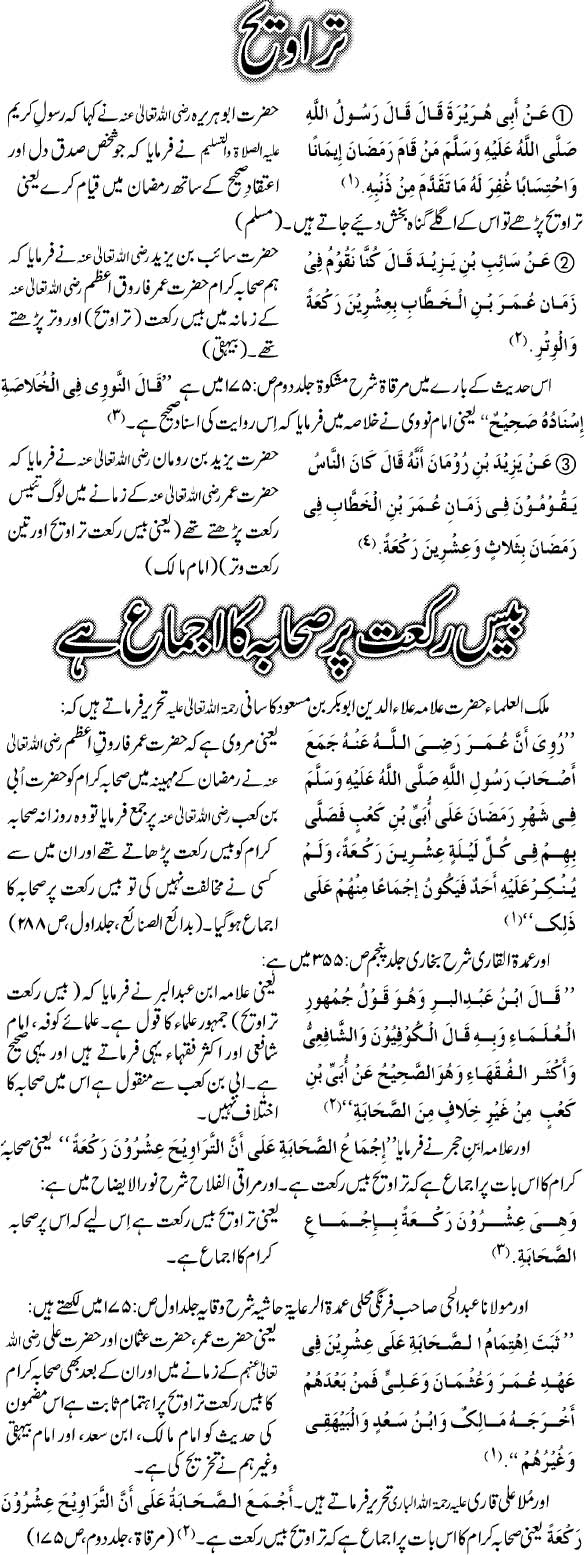
Preparation Of Ramadan
Every Muslim should prepare himself/herself to welcome the blessed month of Ramadan by strengthening his relationship with the Qur’an, busing himself with the spirit of fasting, and recharging his spiritual battery to prepare himself to make the whole blessed month of Ramadan a real occasion of sincere obedience.
Ramadan is an event that occurs in the life of the faithful, as individuals and as an ummah, once a year. It is intended by Allah to help us to recharge our spiritual batteries and thus prepare us for the great mission of realizing his will on earth. Therefore, in order to benefit from Ramadan, we may do well to prepare for it by opening our hearts and minds to embrace it. let me offer a few tips:
1… We should empower ourselves by learning as much as we can about the precise laws as well as the benefits of fasting.
2… We should ensure that we gain true benefits from our fasting, let us make sure to realize the spirit of fasting: this can only be done by abstaining, not only from food, drink, and sex, but also by strictly restraining our minds, hearts as well as our eyes, ears, hands, tongue, and so on.
3… We must embrace the spirit of fasting as stressed in hadith: to be charitable and compassionate as much as we can.
4… We should strengthen our relationship with the Qur’an; for Ramadan is the month of the Qur’an.
5… We should engage in dhikr and condition ourselves to make it second nature.
6… Last but not least, we should build up our community through acts of charity and compassion and extending help to those in need as much as we can.
Let us pray that we come out of Ramadan with our faith recharged, gaining strength in our faith and commitment and relationship with Allah.
Ya Allah!
Surely we have heard a preacher calling to the faith,
Saying: believe in your Allah, so we did believe;
Ya Allah!
Forgive us therefore our faults,
And cover our evil deeds and make us die with the righteous.
Ya Allah!
Grant us good in this world and good in the hereafter,
And save us from the chastisement of the fire.
Ya Allah!
Accept from us;
Surely thou art the Hearing, the Knowing
Ramadan: Ruet-e-Hilal
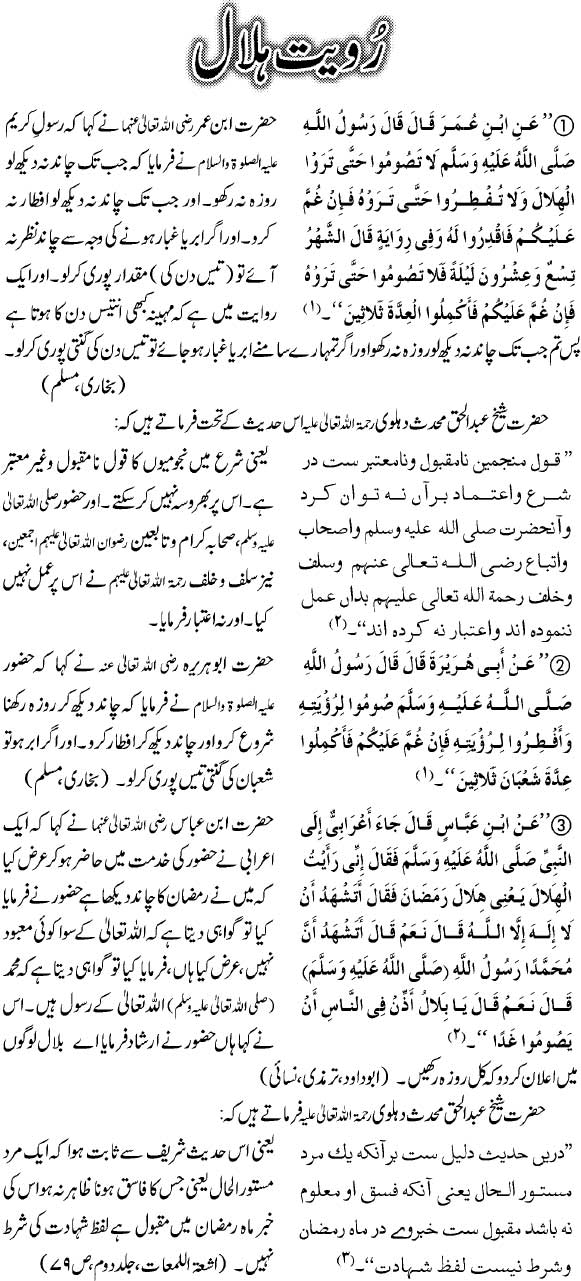
10 Goals To Set For This Ramadan
1. Eat, drink, and be moderate
Almost all of us do it – once Iftar time hits, we just keep plowing food and drink into our mouths till it’s hard to move afterward. And those of us who do it know this is totally contrary to the spirit of Ramadan, through which we’re supposed to learn self-control, not self-indulgence. Let’s try to stick to the Prophetic rule on eating: fill our stomachs with one-third of food, one-third water, and one-third breathing space, even in Ramadan.
2. Give a dollar a day in charity…or five or ten
The Prophet Muhammad, peace and blessings be upon him, was always generous but even more so in Ramadan. Let’s open our hearts and dig a little deeper in our wallets this year. Even less than a dollar a day adds up. Whatever you can give, it’s the intention that counts.
3. Memorize 4 new Surahs
Memorizing the Quran often seems like a daunting task. But the key is doing it in small bites. Since there are four weeks in Ramadan, try to memorize one new Surah a week. Start off with a short, easy one. Once you’ve started, you’ll build momentum and may even want to memorize a longer one the following week.
4. Go to Tarawih prayers
Post-Iftar, the first urge is to sleep after an exhausting day. But try your best to head out to the mosque for Tarawih prayers. Praying alone is wonderful, but doing it in the congregation is fantastic. The community spirit is part of Ramadan’s blessings. Don’t miss it this year. If going every day is not possible, try going at least one week.
5. Attend the Tarawih prayer in which the recitation of the Quran will be finished
Call the local mosque and find out which day the Imam will be finishing the recitation of the Quran in prayer. Attend to not only hear part of the Quran’s recitation in prayer but also participate in the heart-rending Duas that follow it.
6. Stop swearing and/or backbiting with a special box
It’s hard not to shoot our mouths off when someone’s upset us. Whether we utter those four-letter words or backbite about someone to our family and friends, we know this isn’t the God-approved way of letting off steam. In Ramadan, when we want to build our spirituality, we’ve got to wage Jihad against our bad habits.
Try this: get a box and every time you catch yourself swearing or backbiting put some money in it. It could be a buck or less. The point is to choose an amount that makes it feel like punishment.
At the end of the month send the money to a charity or buy a gift for the person whom you’ve backbitten the most against.
7. Call/email your relatives
You’d think that given the easy access to email, competitive long-distance calling rates, phone cards, etc. these days, we’d keep in touch with family and friends more often. But the opposite seems to be the case, as we get caught up in life’s “busyness.”
Strengthening ties with family members and keeping in touch with friends is part of our way of life and an act Allah is very pleased with. This Ramadan, call family and friends or at least email them a Ramadan card and ask them how their fasting is going.
8. Go on a technology diet
Even if you work in the IT industry, you can do this. Avoid checking personal email and surfing the web during your fast. After Iftar, instead of plopping yourself in front of the screen, go to Tarawih. The same goes for the television. The point is to try to give our full attention to spiritual elevation this month.
9. Read 5 minutes of the Quran a day…just five, not more, not less
Even if you feel you’ve got absolutely no time, set a timer or the alarm on your cell phone and find a relatively quiet place. You can read the first page of the Quran you open or follow a sequence. The choice is yours. The point is simply to connect with God through His revelation in the month of the Quran.
10. Forgive everyone who has hurt you
Still, got a festering wound from the fight with your friend last year? Still upset about something your spouse said during a heated argument? Or are you still bitter about the way your parents sometimes treated you as a kid? Let go of the anger and pain this Ramadan and forgive those who have hurt you. Forgiving someone is not only good for the body, but it’s also great for the soul. And in Ramadan, ten days of which are devoted to Allah’s forgiveness, shouldn’t we lesser beings forgive too?
If you find it very difficult to forgive everyone, forgive at least three people.
Ramadan Kay Fazail-o-Barkaat
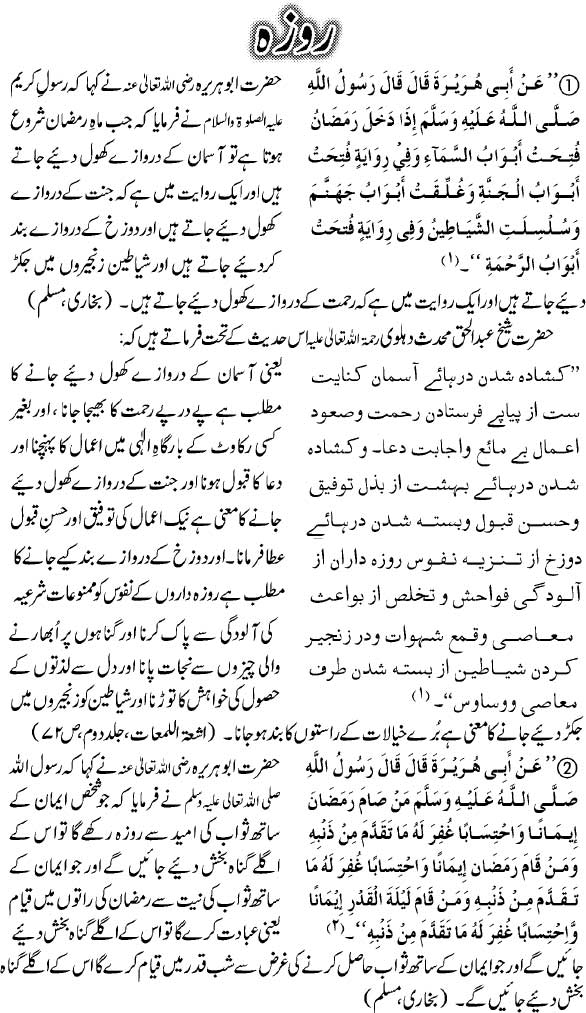
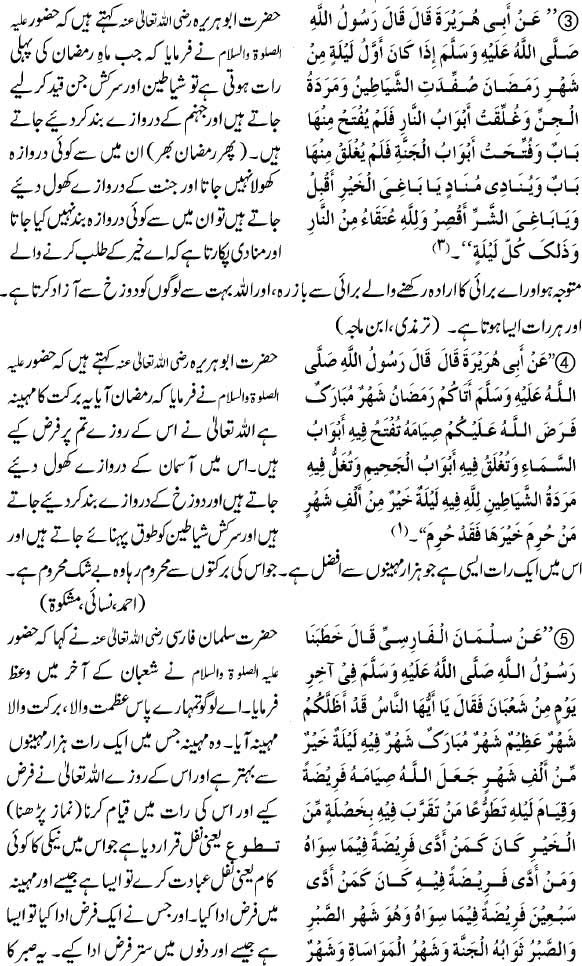

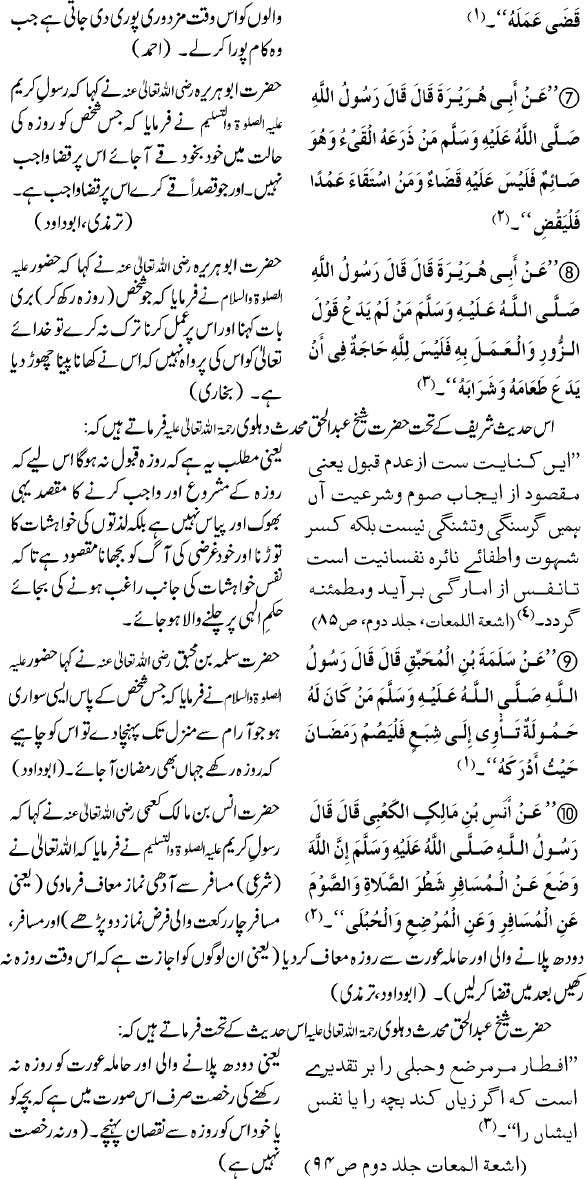

5 Things About Ramadan Traditions
It’s celebration time when Muslims around the world anxiously wait for the first moon of the ninth Lunar month to appear in the sky. Traditionally, families used to gather in their backyards, or get on the nearest hillock or climb on the top of their homes and wait for the pencil-thin moon to appear on the horizon. These days, however, most of us find out whether the moon has been sighted or not from the Internet or TV channels. Here are some Ramadan traditions that are still going strong:
1. The Ramadan Cannon is something that a lot of countries still have. It was historically implemented as a tool to announce the official daily sunset for the people too far away to hear the Adhaan Al Maghreb announce the breaking of the fast. The tradition of using artillery to announce sunset has its roots in Egypt when it was governed by the Ottoman Khosh Qadam, more than two centuries ago. The story goes that Qadam had been given a cannon as a gift, which he was testing during the Iftar of the first day of Ramadan. When he fired it, the whole of Cairo reverberated with its sound and inhabitants thought that this was a new method of announcing sunset.
2. We live in the age of digital alarm clocks. However, this was not always so and the time was when this role was performed by a man going around from house to house in a particular community or area well before Suhoor time in the morning so that people could prepare themselves for the fast and the Fajr prayer. This man, known as the Musaharati, used to dutifully wake people every night in the month of Ramadan so that they could have their Suhoor and still exists in cities like Sidon (in Lebanon), Jerusalem and Cairo.
3. Incense burners are many sought-after items in Ramadan as the burning of incense within homes is considered a form of celebration in Ramadan. The scent, mixed with other concentrated Arabic perfumes, results in a fresh yet intimate smell that can only be associated with festivities and moments of joy. For the month of Ramadan and the three-day Eid that follows, burning incense is an aromatic way to celebrate the purity of the month.
4. On the culinary side, Ramadan is a feast! Ramadan cuisine is a type in itself and Iftar, in particular, has traditionally become a community event, involving family, friends, and neighbors. A variety of dishes are prepared according to the culinary traditions of each country though dates and a dessert made of vermicelli, milk, honey, and nuts is fast becoming a universal delicacy. Also popular across the world are fried goodies, fruit salads, dairy products, and popular local desserts.
5. In many Muslim and non-Muslim countries with large Muslim populations, markets close down in the evening to enable people to perform prayers and consume Iftar. These markets then re-open and stay open for a good part of the night. Muslims can be seen shopping, eating, spending time with their friends and family during the evening hours.
Reality And Obligation In Ramadan
During this Ramadhan do not let the sweetness of our deeds vanish into the night, leaving only emptiness. When one contemplates the texts on fasting, its wisdom, and goals in Shariah, and looks at the reality of the Muslim communities, one realizes a wide gap between reality and our obligations.
Remember that Ramadhan is a bounty that Allah blessed His servants with, to strengthen their faith, and increase their piety (Taqwa). Allah said: “O you who believe! Fasting is prescribed for you as it was prescribed for those before you, that you may become pious.” (Al-Baqarah 2:183).
This article is an attempt to present the essential causes of this gap and to some remedies. the primary reason for the gap is ignorance about the goals of fasting and the wisdom behind it. Many Muslims ignore the purpose and wisdom of fasting. Fasting is done merely to conform to the social environment without contemplation. If one is not aware of the divine wisdom of Shariah and its fruits in this world and in the hereafter, one will not apply it in the right way.
Goals of Fasting
Achieving Taqwa: is one of the most important wisdom of fasting. Fasting brings on Taqwa as it lessens the desire of the stomach and mutes the sexual appetite. Whoever fasts frequently would overcome these two desires more easily. This deters against committing abominations and sins and assist in controlling life leading to Taqwa.
Strengthening willpower and acquiring patience: The Prophet sallallahu alayhe wa sallam called Ramadhan
the month of patience as it increases one’s will power to control his desire and the selfishness of his soul. This training allows him to be strong in following Allah’s commands. The most important being to carry the Message and propel it forward. The person trains himself to be patient in obeying Allah by stopping at the limits set by Allah both by way of action and abstention. Allah said: “These are the limits set by Allah, so approach them not.” (Al-Baqarah 2:187)
Fasting is pure worship: The fact that he is abstaining from food and drink both in public and in secret shows his honest faith and strong love of Allah, and his knowledge and feeling that Allah is all-knowing of everything. For this reason, Allah has made the reward for fasting greater than for any other type of worship.
Allah said in the hadith Qudsi: “Every deed of the son of Adam will be multiplied [in rewards], the good deed by ten of its like, up to seven hundred, up to whatever Allah wills, except fasting, it is for Me and I will reward it. He abandons his desire and his food for My sake..”
(Related by Muslim)
ibn al-Qayyim said: “…And people may see that a person is not eating in front of them, but the fact that he is really abandoning his food and his desire for the sake of God is a thing that nobody can find out about, and that is the essence of fasting.” (Zaad al-Ma’ad 2/29).
Relieving Muslims from life’s distractions: Eating, drinking and socializing all distract a person and weaken ties with Allah. It is by the Mercy of Allah that Muslims are ordered to fast so as not to be bothered by the intrusion of these activities. Nor by the thought about them nor the anticipation for them when devoting themselves to all types of worship Either reading the Qur’an, offering additional prayer, or making I’tikaf. For this reason, the Prophet Sallallahu Alayhi Wa Sallam said: “Fasting is a shield and a secure fortress against Hellfire”
(Related by Ahmad).
Discovering Allah’s Blessings: A person experiences the hardship of the poor. He should then be thankful to Allah Who has blessed him with His bounty while others are deprived. This should make him more sympathetic and willing to share this bounty. The poor rediscovers that fasting helps a person be more devoted to worship. More able to concentrate and meditate. He should then be able of this devotion all year long, a blessing he should thank Allah for.
Acquiring strength and endurance: It has been discovered that depriving the body of food for a period of time helps its defense and endurance mechanism. This in turn this protects the body from certain diseases.
Ramzan Ki Aamad Marhaba
